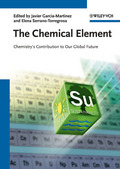The Chemical Element
Chemistry's Contribution to Our Global Future

1. Edition April 2011
XIX, 377 Pages, Hardcover
109 Pictures (59 Colored Figures)
18 tables
General Reading
Wiley Online LibraryContentSample ChapterIndexForeword and Epilogue
Short Description
Prominent scientists highlight the role of chemistry in the fight against the biggest problems faced by humanity. Inspiring and forward-looking, this book is food for thought for everyone paying more than lip-service to the goal of global sustainability.
Buy now
Price: 30,90 €
Price incl. VAT, excl. Shipping
Euro prices for Wiley-VCH and Ernst & Sohn titles are only valid for Germany. In EU countries, local VAT applies. Postage will be charged.
- Out of print -
In the International Year of Chemistry, prominent scientists highlight the major advances in the fight against the largest problems faced by humanity from the point of view of chemistry, showing how their science is essential to ensuring our long-term survival. Following the UN Millennium Development Goals, the authors examine the ten most critical areas, including energy, climate, food, water and health. All of them are opinion leaders in their fields, or high-ranking decision makers in national and international institutions.
Intended to provide an intellectual basis for the future development of chemistry, this book is aimed at a wide readership including students, professionals, engineers, scientists, environmentalists and anyone interested in a more sustainable future.
CHEMISTRY FOR DEVELOPMENT
Chemistry, Innovation and Impact
Poverty and Disparities in Life Expectancy
The Milennium Development Goals
Science, Technology and Development
Chemistry and Development
Science and Technology for National Development
Capacity Building: Some Key Requirements for Chemistry's Role in Development
Chemistry and Future Challenges to Health, Wealth and Wellbeing
Conclusions
THE ROLE OF CHEMISTRY IN ADDRESSING HUNGER AND FOOD SECURITY
Chemistry is the Backbone of Food and Nutrition
Global Hunger and Malnutrition in the World Today
Hunger, Nutrition and the Food Security Mandate
Chemistry's Influence on the Pillars of Food Security
Conclusion
POVERTY
Contribution of Chemistry to Social and Econimic Development
Concept and Historical Evolution of Poverty
Asymmetry of Poverty in the World
Causes of Poverty
Poverty, Malnutrition and Life Expectancy
Strategies against Poverty: A General Approach with Context-Specific Solutions
Chemistry is Essential for Poverty Alleviation
THE HUMAN ELEMENT: CHEMISTRY EDUCATIONS'S CONTRIBUTION TO OUR GLOBAL FUTURE
The International Year of Chemistry Education Challenge
Scene 1 - Chemistry to the Rescue of Threatened Communities
Sequel to Scene 1 - An Education in Chemistry
Equipping the Human Element with Relevant Education in, about and through Chemistry
An Example of Integrating Sustainability and Chemistry Education Curriculum: Visualizing the Chemistry Underlying Climate Change
Scene 2 - Chemistry Education and Our Global Future
THE IMPACTS OF SYNTHETIC CHEMISTRY ON HUMAN HEALTH
The Molecules at the Origin of Drug Discoveries
From Bench to Market Place
General Concepts of Drug Design
Patent Protection Issues
Drug Metabolism and Drug Resistance or Why Make Big Pills?
Antibacterial AGents
Antiviral Agents: The Flu Virus Story: The Naissance of a Sugar-Based Flu Drug
The Viagra Story - Serendipity Leading to a Blockbuster Drug
Human Vaccines as a Prophylactic Health Remedy
Conclusion
THE GREENING OF CHEMISTRY
Introduction
Areas of Green Chemistry
Metrics in Green Chemistry
Conclusions and Future Perspectives
WATER: FOUNDATION FOR A SUSTAINABLE FUTURE
Introduction
Water Pollution and Water Quality
Water Treatment Technologies
Conclusions
FACING THE ENERGY CHALLGENGES THROUGH CHEMISTRY IN A CHANGING WORLD
Introduction
Chemistry and the Role for Development of Society
Chemistry and Sustainable Energy
Sustainable Energy Scenarios and Climate Changes
Nanomaterials for Sustainable Energy
Biofuels
Towards Solar Fuels
Conclusions
OZONE DEPLETION AND CLIMATE CHANGE
Introduction
Ozone in the Atmosphere
The Antarctic Ozone Hole
Arctic Ozone
Montreal Protocol and Beyond
Ozone and Climate Change
Perspectives
Resources
At a simplistic level, both claims are true. Perhaps the hardest task for the public image of chemistry is to convince that, if economic and industrial development are desirable, many chemical problems must have a chemical solution.
Not only were the hazards of chlorofluorocarbons revealed largely by atmospheric chemists, but their safe replacements are the fruits of academic and industrial chemical research. Should anyone question that desirability of development in the first place, the chemist's answer is clear: as Stephen Matlin and Berhanu Abegaz explain in their introduction to this volume, most variation in life expectancy between countries is explained by differences in their technological development.
Chemistry is central to several of the Millennium goals adopted by the UN in 2000: to eradicate severe hunger, reduce child and maternal mortality, combat disease and achieve environmental sustainability. It's not just the positives, like new medicines, that count: better chemistry can reduce pollution and, one hopes, greenhouse gas emissions. This useful book explores all of these ways in which chemistry might benefit our global future.
That case can risk looking like whitewash or propaganda. It's not an accusation that can be levelled at this sober, responsible book; but one can't help noticing that behind the impressive goals and achievements lie political and social questions - how are resources allocated and priorities set, how can ethics coexist with market imperatives - that in the end might determine chemistry's real potential to help or hinder."
- Chemistry World, October 2011
Javier is also member of the World Economic Forum General and of the International Union for Pure and Applied Chemistry (IUPAC). During the International Year of Chemistry, Javier is co-chairing the Global Experiment organized by IUPAC and UNESCO.
Elena Serrano-Torregrosa is a Research Fellow at the Molecular Nanotechnology Lab of the University of Alicante (Spain). Elena received her PhD thesis from the University of Basque Country on the nanostructuration of functional materials and carried out her post-doctoral activity in collaboration with Arkema at the National Institute of Applied Sciences (INSA) at Lyon. Her current research interests are in the area of new synthetic pathways to prepare heterogeneous catalysts by self-assembly of functional materials and block copolymers. Dr. Serrano-Torregrosa has published twenty seven research articles and written three book chapters.
The editors have created a website for their book with additional information. See www.thechemicalelement.com for details.


